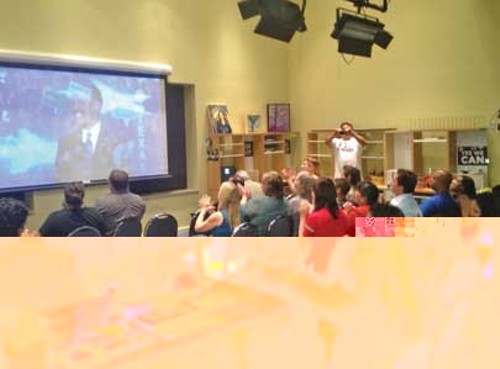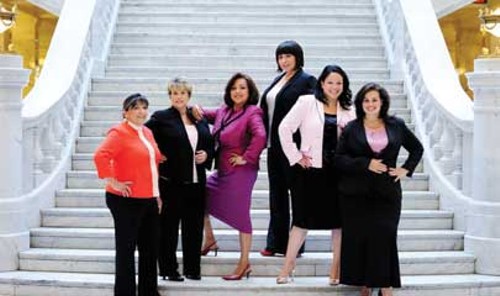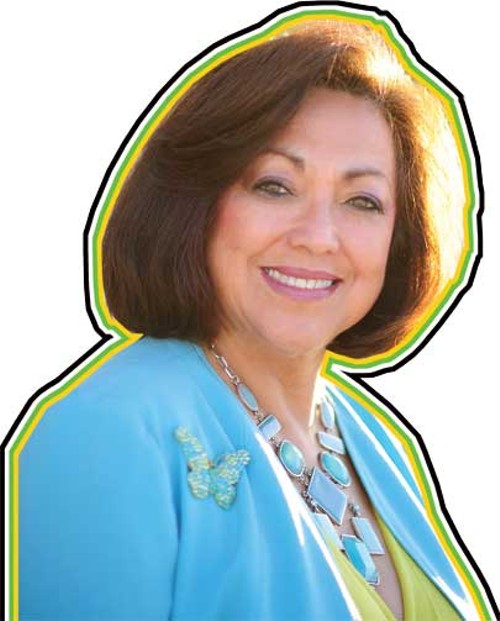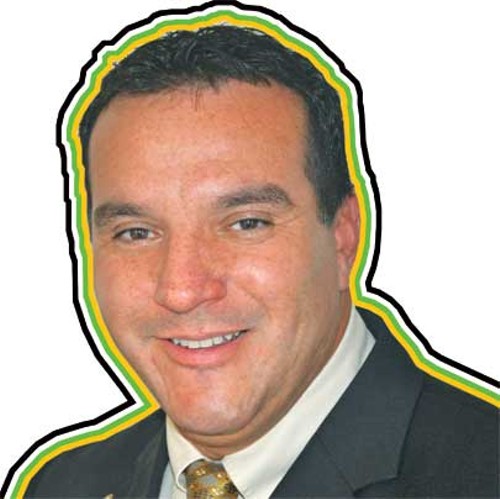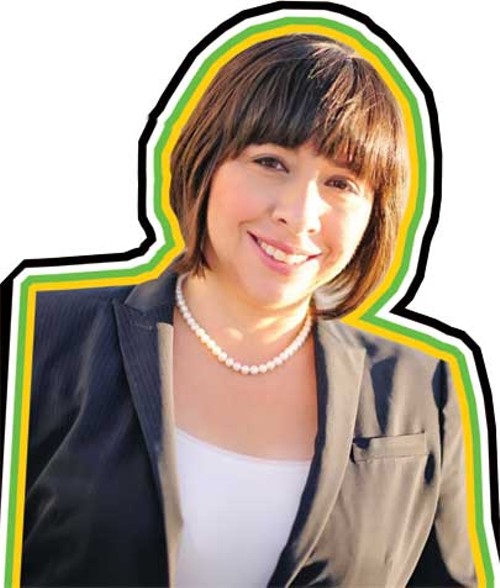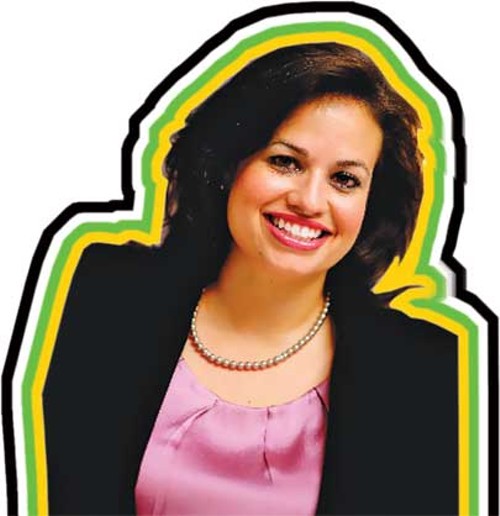When President Barack Obama accepted his party’s nomination for re-election in North Carolina on Sept. 6, the roar of applause was a lot louder on each liberal coast than in the conservative middle of the country, where Democrats are fewer, more moderate and less full-throated in their public hollering for their commander in chief. But even in Utah, where the (D) beside the name of a candidate is generally all it takes to lose an election, there remains a corner of Salt Lake City filled with unabashed, boisterous Democrats.
On the fourth floor of Democratic Party headquarters, a small room is packed with Latino Democrats from the new organization PACE Latino (Political Action & Civic Engagement) and their supporters, who are holding a viewing party to watch the final day of the Democratic National Convention. In this progressive corner of the state, party-goers wave signs, cheer the speakers on the big screen and pass around a few appropriately blue bottles of Bud Light (one candidate laughingly hides a beer bottle when a newspaper photographer angles in for a picture. “Some of my voters …” the candidate says with a sly grin).
The party was orchestrated in part to honor the driving force of PACE Latino creator, Jim Gonzalez, a Democratic strategist who has worked on more than 150 campaigns. In the past year and a half, Gonzalez helped bring five new Democratic Latino candidates from Salt Lake County to run for the Legislature and possibly join three Latino incumbents already at the Capitol: Sen. Luz Robles, D-Salt Lake City; Rep. Mark Wheatley, D-Murray; and Rep. Rebecca Chavez-Houck, D-Salt Lake City. It’s an encouraging dash of diversity, especially considering that four of the new candidates are Latinas.
Gonzalez, a national delegate, along with his brother and 87-year-old mother, expected to share the stage right behind Obama until the national convention moved at the last minute from the Bank of America Stadium to the smaller Time Warner Center.
The venue change meant the PACErs in Utah did not know at the time of the party if they would get to see their strategist and maestro Gonzalez on the big stage. When Obama finished his speech, Gonzalez did not appear, remaining a man behind the scenes.
The crowd at the viewing party, however, is not disappointed. While there are fewer than 30 in attendance that night, the handful of new candidates ready to storm the Capitol represent—at least in ambition—the new demographic of Salt Lake County, which now has 17.4 percent of its population identifying as Latino.
PACE has been meeting weekly for the better part of a year and half, organizing and getting Latino candidates interested in running for office and allowing them to network and learn from candidates who already have. Counting incumbents, PACE originally fielded nine candidates this session, but Sen. Ross Romero, D-Salt Lake City, lost his bid for Salt Lake County mayor at the April Democratic convention.
Lisa Muniz, a new Latina candidate who, in the primary election, toppled 22-year Democratic incumbent Neal Hendrickson from his District 33 seat in West Valley City, says there’s nothing surprising about the fact that this new batch of Latino Democrats are still excited about the Obama presidency, unlike some Democrats who are shuffling or full-on running away from the president’s record. Muniz, who is Gonzalez’s sister, likewise finds something comforting in the faces at the DNC crowd even if she didn’t see her family onstage.
“Sitting here watching the Democratic National Convention versus the Republican Convention, [the difference] is that any single camera shot of the crowd is diverse,” Muniz says. “There are so many minorities, there are women—some people bring their children. There are people still excited about Obama. And there are people excited that we have six Latinas and two Latinos running [in Salt Lake County]. They haven’t had that representation before. Now, they are seeing that there are people that look like them that will represent them.”
Politics by the Numbers
How it is that 2012 became a watershed for these candidates boils down to a few factors, chief among them is the numbers.
“When it comes to politics, as my old friend Blaze Wharton [a former Democratic representative from Murray] told me, you have to learn how to count,” Jim Gonzalez says.
As a behind-the-scenes man, Gonzalez has the freedom to speak without varnish. Asked over the phone about PACE, Gonzalez, from his Target Consulting company, says with a quick chuckle, “Yeah, a bunch of Mexicans taking over …”
Gonzalez sees this election as one that will test the numbers of new Latino voters in the county. Gonzalez, who has worked to engage, recruit and help guide minority candidates through the meat-grinding electoral process, says this year is decades in the making.
Latino candidates at different levels of government have made a push into politics in recent years. State lawmakers including Wheatley, of Spanish descent, will be up for his fifth term; Robles for her second; and Chavez-Houck for her third.
And if even three of the newcomers get elected, the Legislature could see its Democratic Latinos double their voices.
Gonzalez is a noted political brain. He’s consulted since the ’80s and knows how the process works, how voters vote and how demographics change. He knows how tough politics can get and shares more than one off-the-record story of how brutally the punches of politics can land when trying to get Democrats—especially minority Dems—elected in a political landscape long dominated by Mormon Republicans.
Having the votes is one thing, and Salt Lake County’s Hispanic population has been on the rise in the past two decades. According to the Pew Hispanic Center, the number of Latinos in Salt Lake County went from 43,647 in 1990 to 106,787 in 2000—a 145 percent increase to give them 12 percent of the county population. In the 2010 census, the number of Latinos reached 176,015—roughly 17 percent of the county’s total population. The Pew Hispanic Center also reports 123,000 Utah Latinos are eligible to vote in this election.
While Latino populations have historically not made significant impacts at the polls, this year could be different. A 2012 federal ruling is for the first time requiring ballots in the county to be printed both in English and Spanish. Beyond that, Gonzalez says, a new generation of minority children are coming of age and becoming politically conscious in these neighborhoods.
“The thing to understand about the Rose Park, Glendale and Kearns areas is that a lot of those districts were initially settled by blue-collar union families,” Gonzalez says. In the post-war years, railroad workers, Kennecott miners and Dugway Proving Ground workers called those areas home, but as political policies approved more low-income housing in the area, the older generation was gradually displaced by immigrant and refugee families.
While the first wave of minority residents had to focus primarily on making ends meet and providing for their families, their children have been steeped in U.S. political traditions to become voices for their communities. And as the population matures, PACE Latino has been active in voter outreach. PACE Latino made a special push in Salt Lake County high schools, registering Latino youth and others from Kearns High School all the way to Herriman High, and schools in between. From the spring to early summer, Gonzalez estimates they registered roughly 1,200 young voters.
“Before, you would go to community council meetings and it would be occupied by older, white community members,” Gonzalez says. “Now, you’re seeing increasing numbers of Polynesian, Latino and Asian families there because they’re interested in setting the policies that govern those neighborhoods.”
But representing a community doesn’t mean appealing just to that community. Gonzalez points out that all of the PACE candidates campaign from a position of strength when it comes to talking points on education and families, especially given the large minority populations in Salt Lake County schools. According t0 2011 data, for example, 71 percent of the schoolchildren who attend Bennion Elementary in Taylorsville are minorities. Fifty-three percent of West High’s students are minorities.
Losing the “I Care” Debate
In 2010, Tea Party politics dumped a fierce dose of ideology on an already-conservative Legislature, with constituents pushing for tougher policies on transparency, fiscal penny-pinching and, of course, immigration reform.
“Reform” in the 2011 Legislature meant a flood of round-’em-up-style bills aimed at making life difficult for Utah’s undocumented population, which estimates have put at over 100,000 Utahns.
Bills ranged from yet another effort to revoke in-state tuition at public universities for children of undocumented immigrants to Orem Rep. Stephen Sandstrom’s infamous Arizona-lite bill requiring police officers to check the immigration status of individuals arrested on serious misdemeanors and felonies.
These get-tough measures were sought, activists say, because it’s a political slam-dunk to demonize the “otherness” of undocumented immigrants, who, by virtue of living in the shadows, aren’t voters or politically active.
The collateral damage, however, has been the Republican Party’s alienation of the Latino base. While Salt Lake County Dems are running eight Latinos for the Legislature, the county GOP can claim only one candidate, Andres Paredes, running for the House in Poplar Grove’s District 26. Even Utah Gov. Gary Herbert conceded in a recent press conference that his party’s hard line on immigration means “sometimes Republicans lose the ‘I care’ debate.”
But not every Republican is uncaring. The 2011 Legislature also saw lawmakers like Rep. Bill Wright, R-Holden, seek to pass a guest-worker bill to allow undocumented workers the opportunity to work for limited time periods. Utah Attorney General Mark Shurtleff also tried to facilitate a work-visa program between Utah employers and legal immigrants from the state of Nuevo Leon in Mexico. Shurtleff was profiled by The New York Times for advocating for a more compassionate approach to immigration and undocumented immigrants, telling a Times reporter that his conservative colleagues “need to realize [immigrants are] not the enemy.”
Paredes says the GOP’s strong support of family values, self reliance and traditional marriage resonates with Latinos—but he usually first has to explain to them why the party’s not out to get them.
“As far as why Hispanics are not more involved in the Republican Party is basically a lack of information,” especially on the party’s stance on immigration, Paredes says. “I’m trying to re-inform my constituents; that way they can make better decisions.”
But beyond Utah politicos setting up their own political fences on the immigration issue, Democrats say the party is not “big tent” when it comes to valuing diversity.
Josie Valdez, who now, thanks to support from PACE, is running for Senate District 8, has long been informally active in politics, helping to organize the Hispanic Caucus. She recalls a time when she invited a Latino legislator, whom she would not identify by name, to join the caucus.
“He didn’t want to join because he said he was ‘American,’ ” Valdez recalls. “Well, we [Democrats] acknowledge that we are definitely Americans, but we have a heritage and a culture that we’re proud of. It doesn’t take anything away from our patriotism and our Americanism. But here in the state of Utah, you have to put your culture second to the party.”
The diversity blinders hurt Republican outreach in a number of ways, according to Mark Alvarez, an immigration attorney and co-host of the Spanish-language radio show Pulso Latino on Exitos 1550 AM. Alvarez says Republicans fail to grasp the diversity even among Latinos and tend to want to believe all Latinos are conservative because of the conservative, family-centered themes that run among Catholic and LDS Latino communities.
“The Latino community is not a monolithic community in of itself. Speak to any Latino or Latina, and they usually would not label themselves as ‘Latino,’ ” Alvarez says of the term that’s thrown loosely over everyone from Chicanos born in the United States to Spanish speakers from Spain or immigrants from Central or South America. “Even if they were an immigrant from Mexico, they wouldn’t label themselves as Mexicans; they would more likely label themselves as from a specific village or state in Mexico that they’re from.”
While conservative elements run strong in Latin American politics, Alvarez says, too, that many Latinos could be more accurately described as libertarian, citing the fact that countries like Argentina have passed marriage-equality laws and that Mexico City, for example, recognizes same-sex civil unions.
“They respect other people’s liberties,” Alvarez says. “Republicans try to define libertarians as conservative, but on LGBT issues, [Latinos worldwide] are actually more progressive than most Americans in general.”
Game Changer
Gonzalez reflects on the man who encouraged him in politics, who told him a Latino candidate can be effective while pushing past Utah’s perennial scrimmages over draconian immigration laws. That man was Pete Suazo, Utah’s first Latino state senator, who died in August 2001.
Suazo, a youth-boxing mentor, had political punch, Gonzalez says, because his legislation was practical to many Utahns. While Suazo was known for supporting hate-crime legislation in the late ’90s, he also worked on sporting issues, RDA-development legislation and a wide variety of other topics, largely unrelated to ethnicity.
“Working with Pete, politics was a sporting event,” Gonzalez says. “You play for that team and you carry that team’s banner, because it was such a good brand. You get stuff done, and you want to win.”
Whiling away the hours at Suazo’s office balcony at City Hall, back when Suazo worked for Salt Lake City Mayor Palmer DePaulis, Suazo imparted to his protégé the reality that while politics is a sport, you don’t win by playing by other players’ rules. Gonzalez says that means he’s learned how to be part of all the rule-writing of the electoral process. As for the unwritten rules, Gonzalez says those are best rewritten by the candidates themselves, who continually knock down conventional barriers.
There was a time, he says, when openly gay legislators were viewed even by the Democrats as the kiss of death to the party, while today, the LGBT caucus is a powerhouse in state progressive politics. Gonzalez says current PACE candidates are ready to break down even more barriers—as with Valdez, a Latino woman in her mid-60s; or with Robles, a naturalized citizen elected to serve among the gray hairs of the senate when she was only 28; or with two of the PACE Latina candidates, Romero and Milner, running as single mothers.
Even if the current contingent of PACE candidates flops, Gonzalez sees the rules of candidacy being rewritten in a way that could, within the next few election cycles, spread rapidly from Salt Lake County to other counties in the state, such as Tooele, Weber, Davis and even Summit.
“Those rules of conventionality are fading fast,” he says.
Josie Valdez Running for Senate District 8
Age: 64
Day Job: Retired from U.S. Small Business Administration
A Candidacy Decades in the Making
For more than 30 years, Josie Valdez has been politically active, but not allowed to run. She worked for the Small Business Administration, helping oversee a $97 million contracting budget to help women, minorities, veterans and others receive small-business loans. Because she was involved with federal funding, the Hatch Act prohibited her for running for local office.
Now, in retirement, Valdez has officially been “un-hatched” and is free to chase her political dreams. She has run for other offices, including Salt Lake County assessor in 2006 and lieutenant governor (with Democrat Bob Springmeyer) in 2008. Valdez has for years been close to legislative politics, having been married for the past 27 years to Murray Democrat, Rep. Mark Wheatley, but she first gained her political enthusiasm and her belief in herself from the example of her mother. At age 25, Valdez’s mother was faced with the task of raising Valdez and four other children by herself in one of the barrios of Houston after Valdez’s father died.
“It was from her I had an example of independence, wherewithal and stick-to-it-iveness,” Valdez says. “I came from basically a poverty-ridden barrio and yet with this mindset that if you think you can make it happen, then there are no barriers to success.”
Valdez is hopeful her family-centered platform will resonate with voters. She’s pushing for economic stability—arguing that every family needs a strong breadwinner—looking to close the education gap for minority children, and cleaning up the environment in the interest of alleviating children’s asthma.
Valdez believes her deep-set sense of what is equal and right will translate to voters in her district. Her sense of fairness is something that she says has been with her since a young age, when she used to get in trouble in school for drinking from the whites-only drinking fountain.
“I always felt I had every right,” Valdez says. “It didn’t matter which fountain—water was water.”
Elias McGraw Running for House District 38
Age: 43
Day Job: Retired police officer
The Strong Silent Candidate
Soft-spoken and serious, McGraw got his start in public service as a police officer. But his life of service would take a dramatic turn one night in 2002 when McGraw pulled over a possible drunken driver.
“While I was walking up to the car, another DUI came along, 70 mph, and sideswiped the patrol car, overcorrected and hit me,” McGraw says. “There was a witness who said it threw me and spun me 180 degrees onto the sidewalk.”
McGraw soon learned that Utah has the dubious distinction of being only one of two states in the nation that doesn’t offer medical retirement to police officers injured in the line of duty.
Though it’s an issue that affects him personally and is one that he has fought for in his campaign, it’s not been the focus. Instead, McGraw wants to take a holistic approach to crime and education in his district’s neighborhood.
“I started my neighborhood’s first neighborhood-watch program, and one thing we’ve seen is that 70 percent of the graffiti in Kearns alone is not related to gangs, but [is made by] children that have fallen through the cracks and don’t have a place to go after school, [who] come from broken homes or have parents that are working.”
McGraw also spends his time as a volunteer football coach in his neighborhood and wants to fight for better public education for schools in his district. While McGraw’s 2002 injury makes walking at length a painful process, he says his passion makes up for the pain as he’s walked from door to door in his district.
“To me it’s not a candidacy, it’s a cause,” McGraw says.
Liz Muniz Running for House District 33
Age: 58
Day Job: Senior property manager for Salt Lake City Housing Authority
Politics Is Personal
Muniz, at 4 feet 11 inches, is a towering political candidate. Just ask Neal Hendrickson, the 22-year Democrat incumbent whom Muniz defeated in her bid for the nomination. “I beat the crap out of him in the primary,” Muniz says proudly of her 56-44 win.
For Muniz, this was almost a grudge match, not something carefully hatched in advance with campaign strategists.
“The reason I decided to run is that after living three blocks away from Mr. Hendrickson for 24 years, he didn’t even know who I was—which means he didn’t even know who any of his other constituents were,” Muniz says. “I had to explain to him who I was … there was a derogatory remark, and I stewed for three days and then filed against him 15 minutes before the deadline. So it was personal at first.”
Muniz also recognizes that Hendrickson does not represent the diversity of her community anymore. But her platform isn’t focused solely on Latinos, but on the major issues that affect minority and nonminority families in her district—especially education.
“The drop-out rate at Granger High School, for example, is 42 percent,” Muniz says. “We have working families where one or two parents are working, and we have children in high school dropping out to take care of their younger siblings.” She would like to see more programming to help ease the burdens of these families, as well as those of girls who drop out after becoming pregnant in high school.
“I have a daughter who gave birth at 17 years old, and I want other girls her age to know that just because you’re a mother, you don’t have to quit school,” Muniz says.
She can also add her experience with the Housing Authority to her knowledge of low-income housing and says that being married to a police officer gives her insight into the concerns of law enforcement and fire fighters.
Angela Romero Running for House District 26
Age: 39
Day Job: Program manager for Sorenson Unity Center
A Contender for the Community
Angela Romero got her start following the leadership of the late Pete Suazo, Utah’s legend of Latino politics—the state’s first Latino elected to the Utah State Senate.
At age 19, Romero worked on team Suazo as his intern for his House campaign and got a taste for political and community engagement that hasn’t ever let up. Now, 20 years later, Romero’s frenetic community involvement makes her almost like a Latino Leslie Knope from the TV show Parks & Recreation.
Romero has been involved with nonprofits ranging from the Martin Luther King Jr. Commission to NeighborWorks. She serves on the board of Salt Lake City’s west-side Peoples Market and currently works doing community outreach for the Sorenson Unity Center. She’s also served two terms as party secretary for the county Democrats.
Romero is campaigning on being a voice for public education and the environment but is also running, she says, to set an example of voting, organizing and being active in community, from the gritty grass roots of volunteering to running for political office.
Romero, who’s also helped set up English as a second language classes and done volunteer outreach for community art and gardening projects, says involvement is a natural byproduct of her upbringing.
“My grandfather had a second-grade education, and my grandmother had an eighth-grade education,” Romero says. “They knew the power of education and the power of being involved. They always taught me how important it was to give back to your community—if you’re going to take, you have to give back.”
Celina Milner
Running for House District 34
Age: 36
Day Job: Travel & Hospitality
Politics in the Blood
Celina Milner, like many Utah politicians, has a résumé built on working in the private sector. For Milner, that’s a decade of work in tourism and hospitality with Candlewood Suites. “I was born and raised here,” Milner says. “I love the changing face of my hometown and want to share it with everybody.”
Milner was also chairwoman of the board of nonprofit community organization Communidades Unidas before stepping down in anticipation of her campaign.
Milner has kept a close watch on the political process her whole life. Her aunt Joanne Milner served as a representative for three terms in the Utah House in the late ’80s. From the age of 10, Celine would watch her aunt legislate on the Hill and help her put up lawn signs during campaign season.
Milner, now the single mother of a 12-year-old daughter and a 10-year-old son, is passing that tradition of activism along and has brought her children out on the campaign trail to put up signs and check names off clipboards.
“It’s a fun process,” Milner says, though she adds that there were a couple of especially hot days in the summer when the children volunteered to stay home and read or clean the house instead of walking the campaign trail.
For Milner, the campaign trail is key to her race. She’s running on education and improving economic opportunity, but the door-knocking fills out her platform of running as a responsive candidate. She wants to listen to constituents’ issues first and learn how to represent those before trying to sell voters on her plans. If elected, she plans to be a representative who’s in constant contact with her constituents so they know they’re being represented.
Milner also wants to fight the rosy spin some Republicans put on Utah’s economy. She argues that a lot of people are still feeling the recession in her district, with a number of empty storefronts on Redwood Road.
“There’s a problem when we have all these Republicans talking about how wonderful our economy is and yet there are still people hurting, still working families struggling to make ends meet. As a single mom, I know what that’s like,” Milner says. “I want to make sure their voice is heard.”
More by Eric S. Peterson
-
The Secret Sauce
How Utah lawmakers disclose—or don't disclose—conflicts of interest.
- Feb 14, 2024
-
Police departments in Salt Lake County spent almost $20 million on civil rights complaints in the past decade
The Co$t of Mi$conduct
- Oct 18, 2023
-
Women decry harassment and toxic culture at St. George auto dealership
Men at Work
- Oct 11, 2023
- More »
Latest in Cover Story
Readers also liked…
-
Forget the family pedigree—Robert F. Kennedy Jr should not be the next president of the United States
Trojan Horse
- Jun 21, 2023
-
Women decry harassment and toxic culture at St. George auto dealership
Men at Work
- Oct 11, 2023



